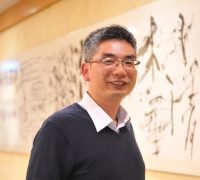Spin-Orbit-Torque Switching in Magnetic Multilayers for MRAM

Speaker: Prof. Chih-Huang Lai
Affiliation: National Tsing Hua University, Taiwan
Abstract: With ultra-fast writing capacity and high reliability, the spin-orbit torque is regarded as a promising alternative to fabricate next-generation magnetic random access memory. However, the three-terminal setup can be challenging when scaling down the cell size. In addition, the thermal stability is another concern. Here we demonstrate two types of layer structures to address these issues. Demonstrated in a variety of non-volatile memories, multilevel storage is an effective remedy to overcome the obstruction of three-terminal setup. However, initialization process for achieving multilevel storage is often inevitable and costs prolonged write latency and wasted power consumption. By engineering multi-domain formation in Co/Pt multilayers, we demonstrate how initialization-free multilevel storage can be achieved by spin-orbit torque switching. With the appropriate number of repeated Co/Pt layers, the multi-domain states become energetically favorable and can be manipulated with precision by spin-orbit torques. It is rather remarkable that, by modulating the writing pulse conditions, we can precisely control the final magnetization states, independent of the initial configurations. The initialization-free multilevel memory advances the spin-orbit-torque MRAM to higher storage density.
In addition, we also demonstrate that the current-pulse-induced switching of perpendicular exchange bias can significantly relieve the concern of thermal stability. The switching of the exchange bias direction is induced by the spin-orbit torque when passing current pulses through the Pt/Co system with an inserted IrMn antiferromagnetic layer. Manipulating the current-pulse-induced exchange bias, spin-orbit-torque switching between states with unidirectional anisotropy is achieved and the thermal agitation of the magnetic moment is strongly suppressed. The spin-orbit torque mechanism provides an innovative method to generate and to control the exchange bias by electrical means, which enables us to realize the new switching mechanism of highly stable perpendicular memory cells.
References:
(1) Initialization-Free Multilevel States Driven by Spin–Orbit Torque Switching
K.F. Huang, D. S. Wang, M. H. Tsai,, H. H. Lin, and C. H. Lai, Adv. Mater. 29, 1601575 (2017)
(2) Manipulating exchange bias by spin–orbit torque, P.K. Lin, B. Y. Yang, M. H. Tsai, H. H. Lin, C.H. Lai, Nat. Mater. 18, 335, (2019)
Biography: Prof. Lai received his Ph.D. in Materials Science and Engineering from Stanford University in 1997. He joined Read-Rite Co. and worked on TMR and GMR heads. He became an assistant Professor in National Tsing Hua University (NTHU) in 1998. Prof. Lai is currently Dean of College of Engineering in NTHU and Tsing Hua Chair Professor. His research works focus on magnetic materials, spintronic devices and CIGS thin film solar cells. He has published more than 200 peer-reviewed SCI papers and obtained more than 30 patents. He is an IEEE Fellow and MRS-Taiwan Fellow.
For more information, contact Prof. Kang Wang (wang@ee.ucla.edu)
Date/Time:
Date(s) - Nov 01, 2019
5:00 pm - 6:00 pm
Location:
E-IV Tesla Room #53-125
420 Westwood Plaza - 5th Flr., Los Angeles CA 90095
